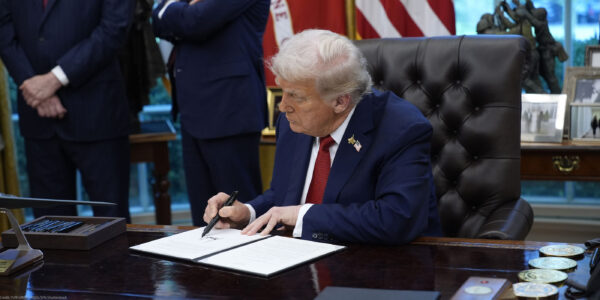
This year, Congress must vote on reauthorizing provisions of the Patriot Act that are due to expire — including Section 215, which the government abused for years to illegally collect Americans’ phone records in bulk. As this debate gets underway, both Congress and the public need some answers.
In 2015, Congress passed the USA Freedom Act to reform parts of the Patriot Act and make other much-needed changes to the government’s surveillance activities. Perhaps most notably, the law prohibited the bulk collection of Americans’ call records, internet metadata, and other private information under several statutes. It also sought to enhance transparency, so that illegal surveillance programs under these authorities would never again flourish in secrecy.
Four years later, however, serious questions remain about whether these reforms have successfully halted bulk collection and other forms of overbroad surveillance. It’s also unclear whether additional measures are needed to safeguard communities of color and Americans engaged in First Amendment-protected activities.
The ACLU has filed a new Freedom of Information Act lawsuit in an effort to shed light on these significant gaps in the public’s understanding. Similarly, in order to inform the coming debate, Congress and the public must demand answers to the following questions.
What additional changes are needed to prevent the bulk collection of Americans’ private data under the Patriot Act?
The reforms passed in 2015 were designed to end the bulk collection programs operated by the National Security Agency and Central Intelligence Agency as well as to prevent the large-scale collection of Americans’ private data under the Patriot Act going forward. But information released by the NSA suggests that these reforms may not be working as intended.
For example, although civil rights groups like the ACLU urged Congress to end surveillance under Section 215 altogether, Congress instead modified that provision, replacing the mass collection of call records with a new framework permitting the government to query records held by companies using narrowly defined search terms. Yet despite the new restrictions, in 2017 alone, the government received 534 million records of Americans’ phone calls based on only 40 surveillance targets. Whether the NSA considers this “bulk” collection or not, the scale is staggering.
Moreover, because the government has failed to provide other key statistics that Congress mandated in the USA Freedom Act, we cannot even determine how many individuals are likely impacted by this surveillance.
Congress and the public must demand information that will help them determine whether provisions of the Patriot Act are still being misused. The NSA must comply with the law and release information that sheds light on how many individuals’ information is likely collected under the Section 215 call record program. The NSA should also say how many records the government has vacuumed up under a single order and how the bulk collection reforms in the USA Freedom Act are being implemented.
Is the Patriot Act being used to infringe on First Amendment-protected activities?
Section 215 and other Patriot Act authorities have long prohibited surveillance based “solely” on First Amendment-protected activities. Yet judicial opinions issued in secret by the secretive Foreign Intelligence Surveillance Court suggest that these safeguards have been interpreted extremely narrowly. Thus, there are serious concerns that past reforms have not done enough to prevent the government from relying on protected speech to obtain surveillance orders.
At the same time, the Justice Department’s existing rules do not prohibit the government from using Section 215 and other provisions of the Patriot Act to target or collect information from journalists. The existing rules do not even provide the limited protections for journalists that apply in the criminal context, because those protections do not extend to Section 215 orders or national security letters. This leaves a serious gap in Justice Department protections to safeguard a free and independent press.
Lawmakers should ask for information about how many surveillance applications submitted to the FISC are based in whole or in part on First Amendment-protected activities. In addition, they should ask the government to disclose how often Patriot Act and the Foreign Intelligence Surveillance Act (FISA) authorities have been used to collect the information of journalists.
Is the Patriot Act being used to discriminate on the basis of race, religion, national origin, or other protected factors?
Historically, government surveillance has often been used to wrongly target, and surveil communities of color. For example, media disclosures revealed that the government was using FISA to spy on prominent Muslim-American leaders during the administration of President George W. Bush. A recently leaked FBI intelligence assessment suggests the agency is targeting black activists as “extremists,” and the Trump administration wants to use “extreme vetting” impacting both immigrants and non-immigrants alike.
Congress should demand information about what safeguards currently exist to prevent discriminatory surveillance and what assessments have been performed to measure whether existing authorities disproportionately focus on minority communities.
Why has the government not disclosed more opinions from the secret intelligence court?
The USA Freedom Act directed the government to make “significant” or “novel” Foreign Intelligence Surveillance Court opinions publicly available whenever reasonably possible. Nonetheless, only a handful of opinions from the court have been published as a result. The government should clarify how it determines which opinions are “significant” or “novel” enough to be published, and it should disclose how many opinions remain completely secret. This information is critical for Congress to determine what additional reforms are needed to ensure transparency.
How many Americans have had their private information collected under other surveillance authorities?
Despite the urging of many members of Congress, the USA Freedom Act failed to include reforms of other surveillance authorities, including Section 702 of FISA. Although the NSA uses this law to collect massive amounts of Americans’ international communications, Congress has been unable to get key information about Section 702’s impact.
For example, the NSA reneged on a pledge to provide an estimate of how many Americans have their communications swept up under Section 702. Congress should demand the release of this information to guide the debate over what other surveillance reforms are needed to safeguard our rights.
Answers to these questions are essential as Congress debates expiring provisions of the Patriot Act and the additional safeguards that are needed to protect Americans’ rights.


